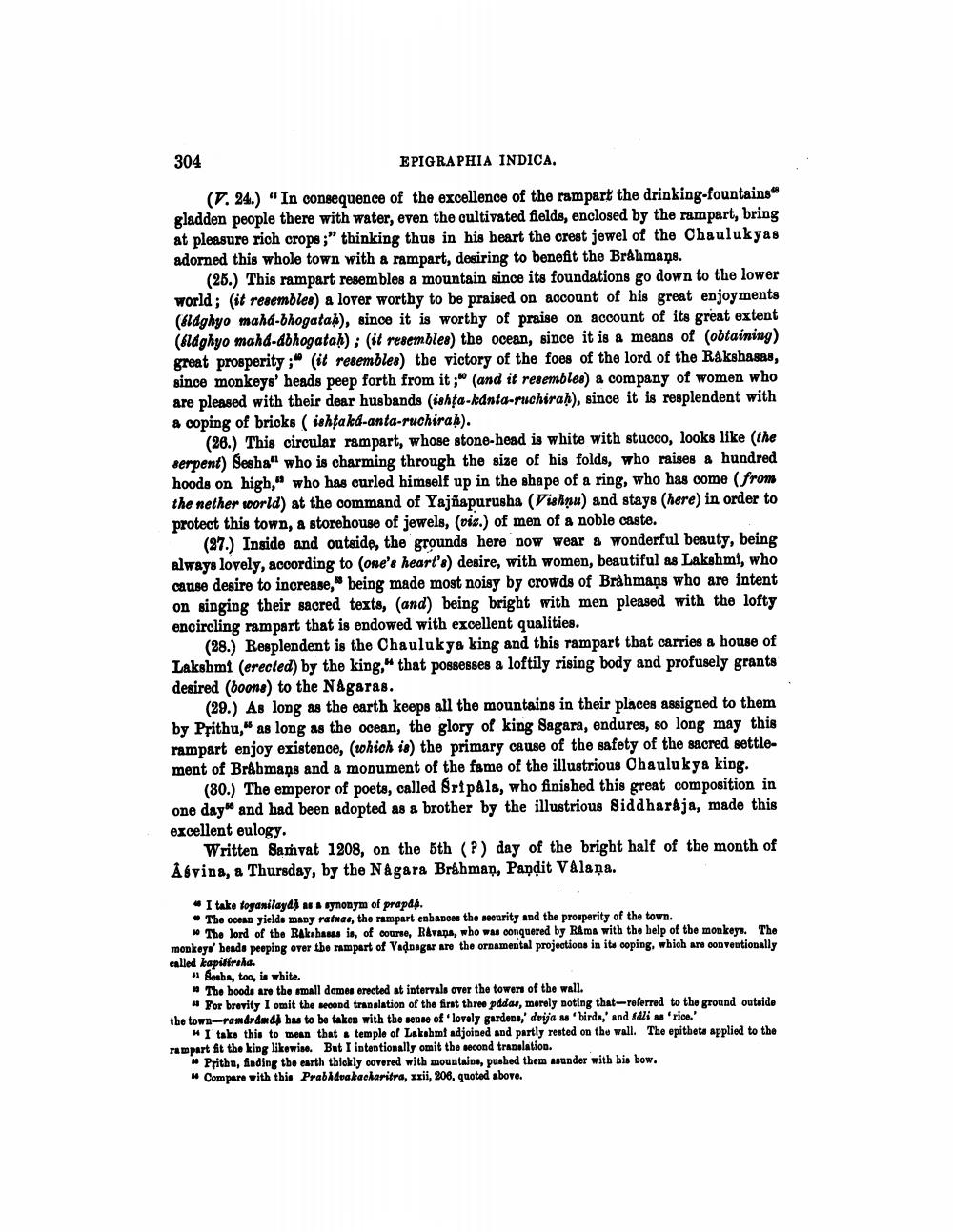________________
304
EPIGRAPHIA INDICA.
(V. 24.) "In consequence of the excellence of the rampart the drinking-fountains gladden people there with water, even the cultivated fields, enclosed by the rampart, bring at pleasure rich crops;" thinking thus in his heart the crest jewel of the Chaulukyas adorned this whole town with a rampart, desiring to benefit the Brahmans.
(25.) This rampart resembles a mountain since its foundations go down to the lower world; (it resembles) a lover worthy to be praised on account of his great enjoyments (élághyo maha-bhogataḥ), since it is worthy of praise on account of its great extent (lághyo mahd-dbhogataḥ); (it resembles) the ocean, since it is a means of (obtaining) great prosperity; (it resembles) the victory of the foes of the lord of the Rakshasas, since monkeys' heads peep forth from it; (and it resembles) a company of women who are pleased with their dear husbands (ishta-kanta-ruchirah), since it is resplendent with a coping of bricks (ishtaka-anta-ruchiraḥ).
(26.) This circular rampart, whose stone-head is white with stucco, looks like (the serpent) Sesha" who is charming through the size of his folds, who raises a hundred hoods on high," who has curled himself up in the shape of a ring, who has come (from the nether world) at the command of Yajñapurusha (Vishnu) and stays (here) in order to protect this town, a storehouse of jewels, (viz.) of men of a noble caste.
(27.) Inside and outside, the grounds here now wear a wonderful beauty, being always lovely, according to (one's heart's) desire, with women, beautiful as Lakshmi, who cause desire to increase," being made most noisy by crowds of Brahmans who are intent on singing their sacred texts, (and) being bright with men pleased with the lofty encircling rampart that is endowed with excellent qualities.
(28.) Resplendent is the Chaulukya king and this rampart that carries a house of Lakshmi (erected) by the king," that possesses a loftily rising body and profusely grants desired (boons) to the Nagaras.
(29.) As long as the earth keeps all the mountains in their places assigned to them by Prithu," as long as the ocean, the glory of king Sagara, endures, so long may this rampart enjoy existence, (which is) the primary cause of the safety of the sacred settlement of Brahmans and a monument of the fame of the illustrious Chaulukya king.
(30.) The emperor of poets, called Sripala, who finished this great composition in one day" and had been adopted as a brother by the illustrious Siddharaja, made this excellent eulogy.
Written Samvat 1208, on the 5th (?) day of the bright half of the month of Asvins, a Thursday, by the Nagara Brahman, Pandit Valana.
I take toyanilayda as a synonym of prapaḥ.
The ocean yields many ratnas, the rampart enhances the security and the prosperity of the town.
The lord of the Rakshasas is, of course, Ravana, who was conquered by Rama with the help of the monkeys. The monkeys' heads peeping over the rampart of Vadnagar are the ornamental projections in its coping, which are conventionally called kapitirsha.
Besha, too, is white.
The hoods are the small domes erected at intervals over the towers of the wall.
For brevity I omit the second translation of the first three pddas, merely noting that-referred to the ground outside the town-ramdrdada has to be taken with the sense of 'lovely gardens,' dvija as 'birds,' and sáli as 'rice."
"I take this to mean that a temple of Lakshmi adjoined and partly rested on the wall. The epithets applied to the rampart fit the king likewise. But I intentionally omit the second translation.
"Prithu, finding the earth thickly covered with mountains, pushed them asunder with his bow. Compare with this Prabhavakacharitra, xxii, 206, quoted above.




